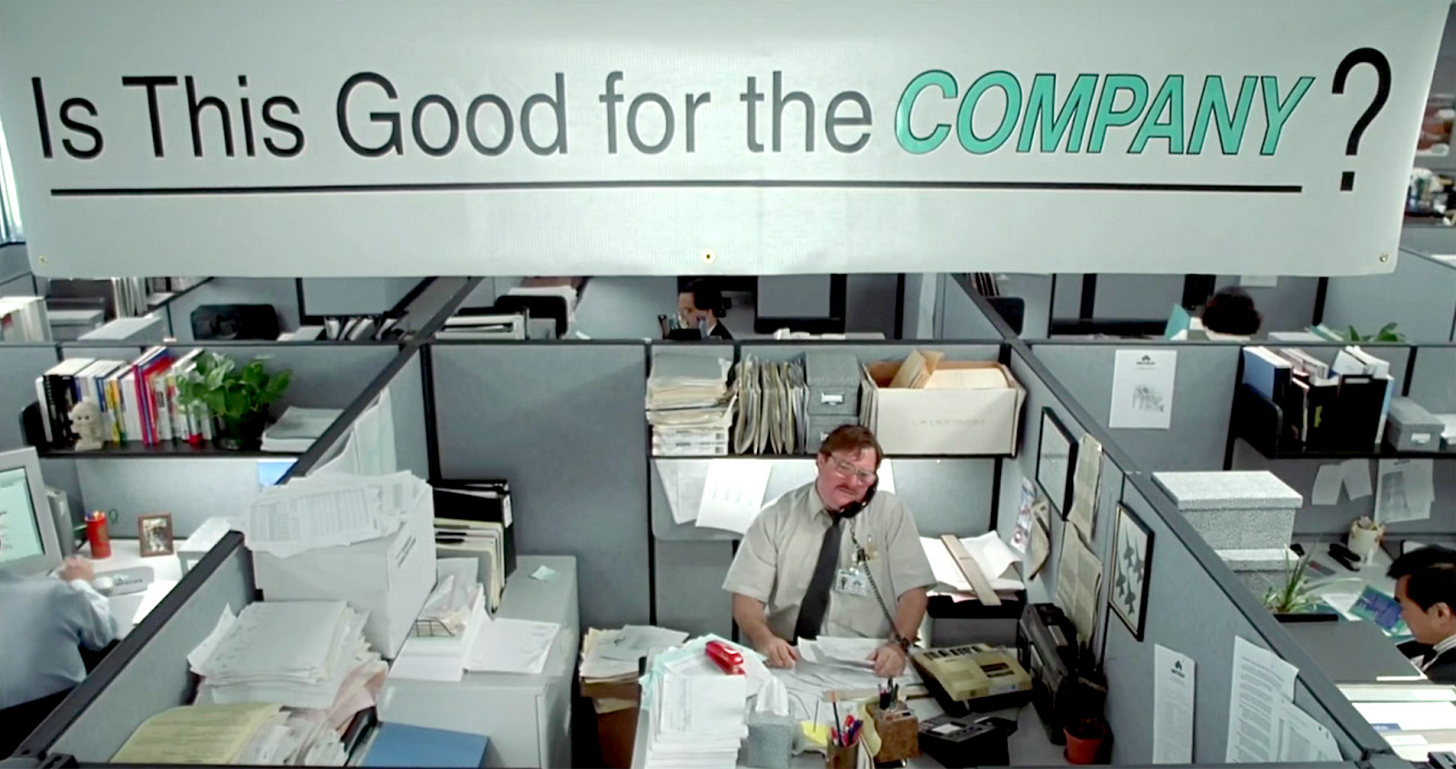Office Space
Light blue
It’s surprising to return to a movie like Office Space (1999) expecting a nostalgic trip down memory lane but finding, instead, a sharply crafted indictment of American work culture that works as well as the day it was released. For the month of June, Movie Night has been focusing on “Blue-Collar” movies. From Wikipedia:
The term blue collar was first used in reference to trades jobs in 1924, in an Alden, Iowa newspaper. The phrase stems from the image of manual workers wearing blue denim or chambray shirts as part of their uniforms.
While it’s obvious that today the term “blue-collar” applies to far more types of jobs than tradesmen, we don’t think of enough jobs in this way. If you work in an office, even a nice office with effervescent beverages on tap and snacks waiting for you in the wings, chances are that you are actually a blue-collar worker in disguise. (Working on my Jeff Foxworthy-esque “you might be a redneck” style tight five as we speak.) Films depicting blue-collar work, almost without exception, are depicting exploitation and inequity. This is because films tend to be about the human experience1, and humans are affected by capitalism2, and capitalism works best when exploitation and inequality can be leveraged to increase profits. By this definition, Office Space, a film ostensibly about “white-collar” workers, is a fitting capstone in our June salute to blue-collar workers, like you. If you haven’t hung out on a yacht off the coast of St. Tropez or worn a cowboy hat on a rocket ship, you are part of the enormous blue-collar system that keeps the world turning. Office Space is a movie about you. It’s a film about a soulless company draining the life out of its employees and discarding them at the earliest opportunity.
The most impressive thing about Office Space is how well it packages its subversive message in a straightforward American comedy. For anyone familiar with writer/director Mike Judge’s work (Idiocracy (2006), King of the Hill (1996-2010), Silicon Valley (2014-2019)) it won’t surprise you that what lies at the heart of Office Space’s humor is, simply, its accuracy. Its extreme fidelity to the absurdity of everyday life. Peter (Ron Livingston) is a 9-5 office worker at software company Initech who is bored, overworked, and stuck in traffic on a daily basis. His boss asks him to work overtime in a passive tone, a practiced form of corporate gaslighting wherein treating an intrusion as “not a big deal” attempts to make it true. Consultants evaluate Peter’s job based on a short description and numbers on a spreadsheet. A server at a restaurant, caught in the same system of workplace-enforced behavioral policy, acts the part he thinks he’s supposed to play, poorly. An all-hands meeting ends with managers asking employees to consider before they take any action at all if it’s “good for the company?” The film plays it down the middle to a degree that, when a character is telling Peter that “good things can happen to people, just look at me!” and he’s sitting in a wheelchair, covered in plaster body casts, completely immobile; we believe that he is 100% sincere. Because he doesn’t have to work anymore.
These events, outside of the context of the peppy comedy that is Office Space, highlight the bleak worldview of a film operating at the peak of subversion. If you’ve seen the film, then you probably remember the chain of events kicked off when Peter goes to see an occupational hypnotherapist, and the therapist suffers a heart attack in the middle of Peter’s hypnosis, leaving him in a deep state of uncaring. If you haven’t seen the film, and especially if you are one of the many people who feel like work requires you to be someone you aren’t, you should check it out.
At the end of the movie, in perhaps its most subversive statement, we find Peter in a surprising new work situation. It could be compared to work you would find incarcerated people doing, but despite this, Peter is finally happy. This is not to say that the film is optimistic: no one escapes the status quo of American capitalism. But Peter gets to spend more time outside in his new work environment, and maybe that’s the best any of us can hope for.
Office Space
Written and Directed by Mike Judge
1999
90 minutes
English
Citation needed
Citation needed

